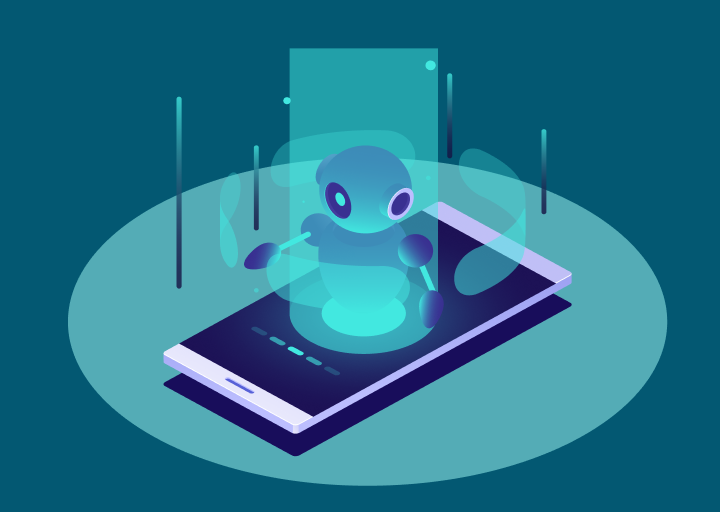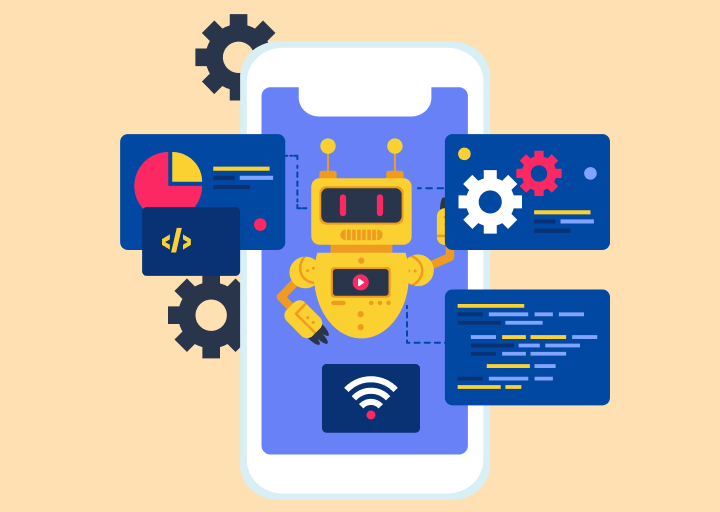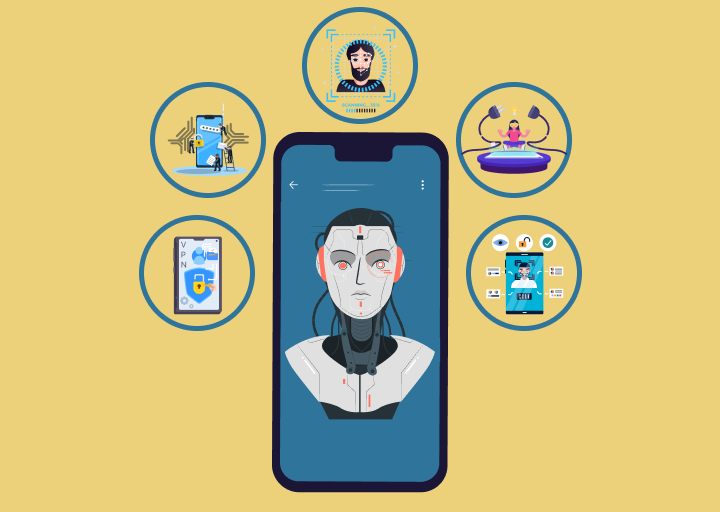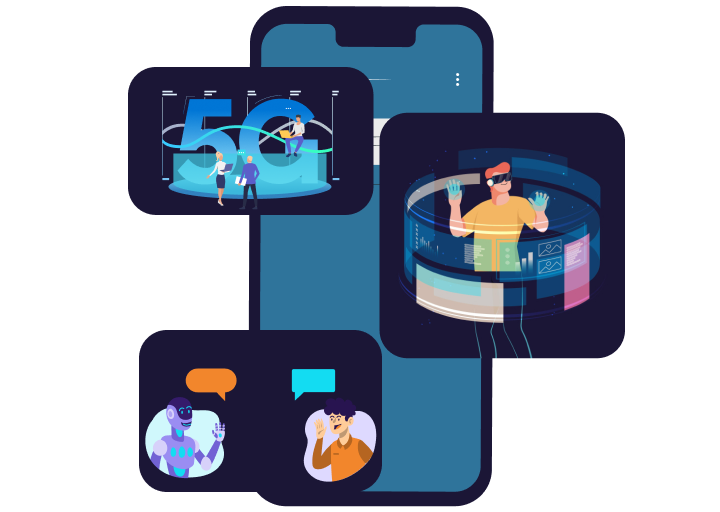Artificial Intelligence, or AI, involves programming machines to mimic human intelligence, encompassing technologies like machine learning, natural language processing, and computer vision. These technologies enable machines to undertake tasks that typically require human intellect.
The integration of AI into mobile phones marks a significant evolution, transforming them from simple communication tools to intelligent assistants. Initially, mobile phones had limited functions; however, AI advancements have turned them into powerful computing devices, improving user experiences by making smartphones more intuitive and adaptive.
Table of Contents:
1. How Does AI Enhance Efficiency and User Satisfaction in Modern Mobile Devices?
2. How Artificial Intelligence Has Redefined Mobile Photography
3. What are the Principal Advantages and Privacy Issues Related to AI Integration in Smartphones?
4. What are the Key Challenges and Ethical Considerations of AI Integration in Mobile Phones?
5. Benefits of AI in Smartphones for Marketers
6. How is the Integration of AI with AR/VR Transforming User Experiences on Smartphones?
7. What are the Current Attitudes and Sentiments Among Smartphone Users Towards AI?

This progression is evident through features such as voice recognition, predictive text, and personal assistants. AI is now integral to mobile operating systems, supporting functionalities like facial recognition, augmented reality, and adaptive performance optimization.
This blog explores the extensive impact of AI on mobile phones and how it has profoundly influenced our daily lives. We will examine the benefits of AI in smartphones, exploring how it not only enhances communication but also simplifies various routine tasks.
How Does AI Enhance Efficiency and User Satisfaction in Modern Mobile Devices?
The integration of Artificial Intelligence (AI) into mobile phones has catalyzed significant changes, boosting user satisfaction and operational efficiency. AI in smartphones enhances device capabilities and opens new avenues for user-centric innovations.

A. Enhanced User Experience
1- Personalization
AI in smartphones enables a personalized user experience by utilizing advanced algorithms to analyze user behavior, preferences, and patterns. This personalization tailors the device’s functionalities to individual preferences, creating a more intuitive and tailored interface. Personalized app, content, and settings recommendations enrich and enhance the mobile experience.
2- Predictive Text and Suggestions
AI-driven predictive text and suggestions have transformed mobile communication. Utilizing natural language processing, AI anticipates the next words or phrases based on typing habits, offering relevant suggestions that increase typing speed and reduce errors, enhancing communication efficiency.
B. Improved Efficiency
1- Virtual Assistants
AI-powered virtual assistants are now crucial components of modern smartphones, providing voice-activated, hands-free functionalities. These assistants, such as Siri, Google Assistant, and Bixby, use AI to comprehend and execute user commands, facilitating daily tasks and enhancing user accessibility.
2- Task Automation
AI in smartphones automates routine tasks, easing daily routines and saving time. By learning user behaviors, AI can automate tasks like email organization, reminder setting, and preference-based setting adjustments, increasing efficiency and allowing users to concentrate on more significant activities.
How Artificial Intelligence Has Redefined Mobile Photography
In the dynamic world of smartphone technology, artificial intelligence (AI) has emerged as a transformative force, reshaping our approach to capturing and preserving memories. The fusion of AI with mobile photography has led to significant breakthroughs, elevating the user experience and expanding the capabilities of smartphone cameras. This article explores the diverse roles of AI in mobile photography, highlighting the key innovations that have altered our interaction with smartphone cameras.
A. Image Recognition
1- Face Detection
A standout feature in AI-enhanced mobile photography is face detection. Utilizing sophisticated algorithms, smartphones now precisely identify and focus on faces within a photo. This capability not only delivers sharp, well-lit portraits but also supports automatic face tagging and beautification, making for a smooth and tailored photography experience.
2- Object Recognition
AI also excels in recognizing objects, taking mobile photography to the next level. Smartphones with AI can detect various elements in a scene, enabling intelligent scene optimization. This functionality improves image quality by fine-tuning settings based on the identified objects, resulting in vibrant, well-composed shots.
B. AI-driven Camera Features
1- Portrait Mode
The influence of AI on portrait photography is profound, as evidenced by the advent of Portrait Mode. Utilizing advanced depth-sensing algorithms, AI-equipped smartphones can mimic the shallow depth of field typical of professional DSLR cameras. This effect produces eye-catching bokeh that emphasizes the subject and blurs the background, creating visually appealing portraits.
2- Night Mode
Night Mode, powered by AI, addresses the longstanding issue of low-light photography for smartphone users. Through complex algorithms, smartphones are now capable of capturing bright, detailed photos even in poor lighting conditions. This mode optimizes exposure, minimizes noise, and boosts image quality, allowing users to capture night scenes with remarkable clarity.
The integration of AI into smartphones has not only introduced these innovative features but has also revolutionized how users interact with their devices.
What are the Principal Advantages and Privacy Issues Related to AI Integration in Smartphones?

1- Facial Recognition and Biometric Authentication
As AI-driven biometric authentication advances, facial recognition stands out as a key security measure for smartphones. By analyzing distinct facial characteristics, this technology enhances user authentication and strengthens device protection against unauthorized access. Nevertheless, the rising adoption of AI in smartphones necessitates a careful examination of the privacy risks linked to facial data processing and storage.
2- Privacy Challenges and Responsible AI
Despite the security enhancements AI brings to mobile devices, significant privacy concerns persist. It is crucial to find a fine balance between the benefits of AI integration and the protection of user data. Adopting responsible AI practices and fostering collaboration between developers and regulators can help develop comprehensive guidelines for ethical usage and secure handling of sensitive data, safeguarding user privacy.
3- AI-Based Mobile Security Measures
AI extends its utility in smartphones to proactive threat detection and fraud prevention. Smartphones utilize sophisticated algorithms to scrutinize user behavior and network interactions, spotting unusual patterns that may indicate security threats. This proactive security approach allows for continuous monitoring and adaptation to evolving threats.
4- Dynamic Defenses Against Fraud
Smartphones are susceptible to various fraudulent activities, including phishing and financial scams. AI integration in these devices enables the identification and neutralization of such threats. Machine learning algorithms are continuously updated to recognize new patterns of fraud, providing users with evolving defenses that match the pace of new threats and ensuring a secure digital experience.
5- Balancing Innovation and Responsibility
The incorporation of AI into smartphones ushers in a new era of enhanced security, which demands a judicious balance between innovation and responsibility. As we explore the potentials of AI in smartphones, it is paramount to address privacy issues and set ethical standards. By responsibly leveraging AI technology, we can foster a secure and innovative digital environment while protecting user privacy amidst the rapidly changing mobile technology landscape.
What are the Key Challenges and Ethical Considerations of AI Integration in Mobile Phones?
Artificial Intelligence (AI) has become a fundamental part of our daily lives, particularly through its integration into smartphones. While the benefits are significant, it is important to consider the challenges and ethical issues that accompany this technological evolution.
1- Bias in AI Algorithms
A major concern in mobile AI is the potential bias within algorithms, which might replicate and perpetuate existing societal biases, leading to inequitable outcomes, especially in facial recognition technologies. Continuous vigilance, diverse data inputs, and regular algorithm updates are necessary to ensure fairness and inclusivity.
2- Privacy Issues
AI integration raises significant privacy issues in smartphones through extensive data collection and analysis. Balancing personalized AI features with user privacy requires strong encryption, clear data policies, and explicit user consents to prevent data breaches and misuse, thus fostering trust.
3- Job Displacement Concerns
AI’s prevalence in smartphones also raises job displacement issues, as AI-driven automation may supplant human roles in certain industries. It is crucial for stakeholders to proactively engage in creating educational initiatives and adapting the workforce to accommodate technological changes, maintaining a balance between innovation and employment stability.
Read Also: AI Use Cases and Applications in Key Industries
What Does AI on Mobile Technology Mean For Marketers?
The integration of Artificial Intelligence (AI) into mobile technology has revolutionized marketing, introducing new tools and capabilities that enhance user engagement and provide deep insights into consumer behavior.
AI in Smartphones: A Game-Changer for Marketers
AI in smartphones encompasses a variety of applications crucial for cutting-edge marketing strategies. This includes predictive analytics and machine learning, enabling marketers to dissect extensive data sets for nuanced consumer insights, shaping highly personalized marketing initiatives.
Benefits of AI in Smartphones for Marketers
AI adoption in smartphones offers multiple advantages for marketers:
1- Enhanced User Experience
AI-powered features like chatbots and virtual assistants deliver personalized user interactions, elevating the overall brand experience.
2- Predictive Analytics
Marketers utilize AI to foresee consumer trends and behaviors, allowing for preemptive strategy adjustments.
3- Optimized Advertising
AI facilitates precise ad targeting based on user preferences and behaviors, increasing ad relevance and engagement.
4- Efficient Data Analysis
AI streamlines the processing of large data volumes, aiding marketers in quickly deriving actionable insights and informed decisions.
5- Voice Search Optimization
As voice recognition technology becomes a standard feature in smartphones, marketers are adapting content for voice searches to cater to users increasingly reliant on voice commands.
With ongoing advancements, smartphones are poised to integrate more complex AI features, such as augmented reality and natural language processing, expanding the arsenal of tools available to marketers.
How is the Integration of AI with AR/VR Transforming User Experiences on Smartphones?
In the rapidly evolving mobile technology sphere, Artificial Intelligence (AI) is set to radically enhance smartphone capabilities, introducing a new wave of innovation and user interaction. As we look to the future of AI in mobile phones, three key trends are poised to redefine the industry:

1- Integration with 5G Technology
The combination of AI and 5G technology marks a critical step in boosting smartphone performance. This integration allows AI algorithms to leverage 5G networks for quicker data processing, reduced latency, and enhanced connectivity, facilitating smooth communication and enabling real-time processing by AI applications on smartphones.
2- Augmented Reality (AR) and Virtual Reality (VR)
The merging of AI with AR/VR technology is transforming user experiences, making immersive environments more accessible right from our smartphones. This integration enables the creation of lifelike, interactive simulations that merge digital and physical worlds, paving the way for innovative applications like augmented navigation and virtual shopping.
3- Advances in Natural Language Processing
The ongoing improvements in Natural Language Processing (NLP) remain at the forefront of mobile AI development. Enhanced voice assistants and improved language comprehension capabilities allow smartphones to better understand and react to subtle nuances in human speech.
In summary, with the strategic integration of AI with 5G, along with advancements in AR/VR and NLP, smartphones are increasingly becoming hubs of cutting-edge technological innovation.
What are the Current Attitudes and Sentiments Among Smartphone Users Towards AI?
Artificial Intelligence (AI) has brought a new level of technological sophistication to mobile phones, significantly impacting user experiences. This section explores user perspectives on AI in smartphones, drawing from surveys and research that highlight the complex relationship between technological advances and user experiences.
1- Surveys and Research
Adoption Trends: Surveys indicate a growing acceptance of AI in smartphones, with users appreciating AI features like predictive text and intelligent assistants.
User Satisfaction: Research on user satisfaction points to positive responses towards AI-enhanced applications due to their ability to streamline daily tasks and improve efficiency.
Future Expectations: Users expect future AI enhancements to deliver more intuitive voice interactions and personalized services, including health monitoring features.
2- Public Perception and Concerns
Privacy Issues: While AI adoption grows, data privacy remains a significant concern, with users wary of how their personal information is handled by AI systems.
Ethical Challenges: The ethical implications of AI, such as algorithmic bias and decision-making transparency, are critical areas of public debate.
Human Interaction and Environmental Impact: Discussions also cover AI’s effects on human interactions and its environmental footprint, focusing on the need for sustainable AI practices.
Conclusion
The integration of AI into smartphones offers numerous benefits, from personalized user experiences to enhanced device functionality. However, addressing ethical and privacy issues is essential to maintain transparency and user trust in AI technologies. As the industry progresses, the dialogue between users, developers, and regulators will shape the trajectory of AI in smartphones, fostering a harmonious integration of technology with user-centric values.
Etelligens, an AI development firm, excels in crafting tailored solutions that meet the unique needs of its clients. With a focus on innovation and quality, Etelligens harnesses its expertise to develop intuitive and impactful mobile applications. Their commitment to collaboration and customer satisfaction helps businesses harness the full potential of AI, turning innovative ideas into practical applications and driving sustained success in the mobile tech landscape.